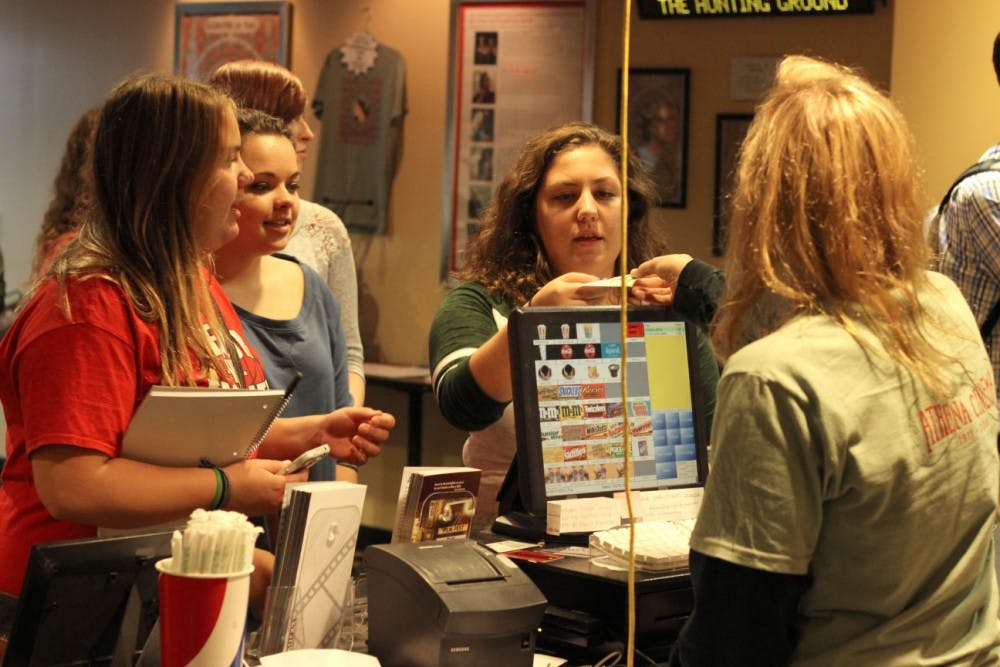Ohio University officials precede The Hunting Ground, a documentary about sexual assault on college campuses, with message detailing support resources available on campus.
Four days after Lisa Buch had moved to Athens from New York, a sign on Mill Street caught her attention.
“21 to drink. 18 to get your bean flicked,” the sign read.
“My heart was racing. … I was appalled. I just couldn’t believe that something that overt — that it was just accepted,” Buch, a first-year graduate student studying acting, said. “I just couldn't believe it and how people were walking in thinking, ‘Oh, this is so funny,’ and not thinking critically about the impact that (it) has.”
Buch’s previous work on a play about rape and the Mill Street sign spurred her into seeing The Hunting Ground Monday night.
“I was thinking about all of the little subtle messages (the sign) sends to people," Buch said. "This is how a lot of these things start. … It’s a slippery slope. It’s one of the most difficult crimes to prove. … It starts from things like this sign.”
Released February 2015, The Hunting Ground details several cases of sexual assault at various universities across the country. Using interviews with survivors, parents, campus police, college administrators and psychologists, the documentary explores the difficulty prosecuting rape cases in court and even campus repercussions.
The film highlights cases at colleges, including the University of North Carolina-Chapel Hill, University of California Berkeley, University of Notre Dame and Florida State University — specifically the case against the Seminoles’ quarterback Jameis Winston.
The Hunting Ground will be screened at The Athena Cinema, 20 S. Court St., now through Thursday, with two showings on Wednesday and Thursday at 4:30 and 7 p.m. Admission is free for any screening.
“Being screened for free on Court Street gives (The Hunting Ground) the ability to reach lots of people,” Buch said. “(The movie) busts certain misconceptions on rape.”
A "Carry the Weight" event at OU is briefly shown in the film, where individuals marched through campus last year carrying a mattress in support of and in response to a Columbia University student who did the same for her thesis after accusations against her alleged rapist were dismissed, according to a previous Post report.
Sarah Jenkins, program coordinator for the Women’s Center, said the documentary is worth seeing.
“I think it’s really important that college students are educated about what their universities are doing, and our students need to be a part of the decision-making that goes on in our universities,” she said. “The cases The Hunting Ground covers are very recent. ... They’re very high profile. … It's really important for our students … to think about what this means for OU, to think about how we can make OU better with this information.”
{{tncms-asset app="editorial" id="f4108e5a-5fe9-11e5-aed7-83ecae7c0d44"}}
Delaney Anderson, program coordinator of the Ohio University Survivor Advocacy Program, said during and after each screening of the film, support services for viewers would be available at 31 S. Court St., home to the Women’s, Gender and Sexuality Studies offices.
Tim Ashby, a first-year graduate student studying acting, saw the film and said it has “immense social implications.”
“The movie lifts the lid off the things being covered up at colleges across the country,” Ashby said. “Lots of administrations are falling into the trap of protecting their namesake at any cost in order to get money. It irritates me.”
Before the film, OU showed a video featuring Anderson, Interim Vice President for Student Affairs and Dean of Students Jenny Hall-Jones, OU Police Department Chief Andrew Powers and OU’s Title IX Coordinator Inya Baiye.
All four advocated for students to report any kind of unwanted sexual contact and described the various ways to do so.
“We want you to know that we care, and we’re here to help,” Hall-Jones said in the roughly four-minute video.
Every person who walked into the theater was given a handout of services survivors can use on campus and in Athens.
The sheet also provides tips for reporting sexual misconduct.
Since the beginning of Fall Semester, OUPD has received six sex-related crime reports, and the Athens Police Department has received one report, according to previous Post reports.
“I genuinely think OU is here to help the students,” Hanna Tredway, a junior pursuing a bachelor of specialized studies, said after watching the video.
A Campus Conversation will be held in response to the film Sept. 29 from 4 to 6 p.m. in Walter Hall Rotunda. The conversation is titled “Taking Sexual Misconduct Seriously.”
In light of the documentary, Ashby said it was “encouraging” to see OU officials advocating for students to report sexual misconduct.
“It gave me hope that this administration hopefully will take it seriously like if something gets reported then … action will be taken,” Ashby said.
Alyssa Ensminger, a member of F--kRapeCulture, said she has not yet seen the film, but plans to. She said silence is a “dangerous” and “damaging” way to handle sexual assault cases.
“I think — and hope — that by seeing this film, people will feel more comfortable stepping up when they think there is something wrong happening, will understand how disastrous it is to question or second guess a survivor willing to confide in them, and will learn to take this issue that is still so common much more seriously,” Ensminger, a junior studying molecular and cellular biology, said in an email.
@broermazing
@MariaDeVito13
md781510@ohio.edu
@buzzlightmeryl
mg986611@ohio.edu






